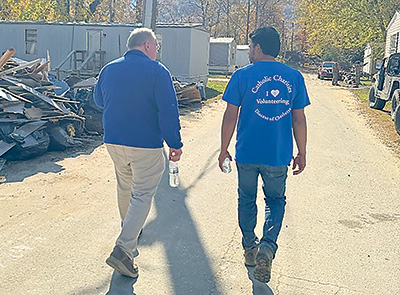EDITOR’S NOTE: Catholic Charities Diocese of Charlotte is highlighting the seven themes of Catholic Social Teaching as part of its year-long 75th anniversary celebration. In this final installment of the series, the focus is on promoting the common good. CHARLOTTE — Building on its 75-year mission of serving the common good in the Diocese of Charlotte, Catholic Charities has mobilized resources in the wake of Tropical Storm Helene’s devastating impact on western North Carolina. Rooted in Catholic Social Teaching, these disaster relief efforts aim to rebuild not just homes but hope – ensuring that no one faces the journey to recovery alone.
CHARLOTTE — Building on its 75-year mission of serving the common good in the Diocese of Charlotte, Catholic Charities has mobilized resources in the wake of Tropical Storm Helene’s devastating impact on western North Carolina. Rooted in Catholic Social Teaching, these disaster relief efforts aim to rebuild not just homes but hope – ensuring that no one faces the journey to recovery alone.
Helene wreaked havoc in western North Carolina: more than 100 confirmed deaths, homes and businesses destroyed, services disrupted, and severe economic damage estimated at over $50 billion.
Donations to Catholic Charities have already been put to work, starting with critical aid in the immediate aftermath of the storm. Diocesan and Catholic Charities staff coordinated with more than 100 partners – including parishes, civic groups, schools, companies, volunteer organizations and people representing recovery initiatives across the country – to get emergency supplies such as water, food, diapers, clothing, heaters and blankets to thousands of people.
Funds are also enabling Catholic Charities to provide financial help to more than 700 households, with a goal of serving over 1,000 by the end of this month. Monetary help is taking many forms, paying for home repairs, vehicle repairs or purchases, help paying rent or utility bills, temporary housing or relocation, tree and debris removal, driveway repairs, bus tickets, Helene-related burials, replacement furniture, help paying school tuition, and more.
So far nearly 1,000 households have reached out for help, and Catholic Charities is dramatically increasing and training new caseworkers to respond.
“We’re rapidly filling new positions, with our disaster team growing – from one staff person dedicated part-time to disaster relief pre-Hurricane Helene to seven hired in the past month to an estimated 10 by year-end,” said Dr. Gerard Carter, Catholic Charities’ executive director. “In addition to large areas of need that receive a lot of publicity, we’re working to provide resources to those families living in underserved and under-resourced areas of the diocese. Our special concern is those families without the resources to rebuild and recover their lives.”
Looking beyond immediate relief, Catholic Charities is accompanying individuals and families for what is expected to be a long road to recovery. While some are seeing a quick return to pre-Helene normalcy, many others face significant obstacles to rebuilding their homes, jobs and lives. For these families, the need lies in the gap between what resources are available and the cost of rebuilding.
Flood insurance was not common for many of those who were impacted by the storm, for example, so now they have limited, if any, help from their insurance provider. Federal help from FEMA is proving helpful for households that are uninsured or underinsured, but the few hundred dollars in aid is not enough to help others who face thousands of dollars in home repairs.
“It’s that gap between what insurance, FEMA and private funds can provide and the actual cost of a rebuild where Catholic Charities will have the greatest impact,” Carter said. “Without those gap funds, homes simply never get fully rebuilt.”
At the heart of Catholic Charities’ disaster recovery efforts is a resolve to exemplify the Parable of the Good Samaritan (Luke 10:29-37) – recognizing the needs of our neighbors, responding with compassion, and promoting the good of all.
Read the full 75th anniversary series

Catch up on previous stories in Catholic Charities’ 75th anniversary series, published in print and online at www.catholicnewsherald.com:
- Care for God’s Creation: “Catholic Charities offers bountiful resources on caring for our common home” (May 24)
- Welcoming the Stranger: “Helping refugees find new lives in North Carolina” (June 21)
- Rights and Responsibilities: “What does our faith teach us about rights and responsibilities?” (July 12)
- Caring for the Poor and Vulnerable: “Reaching out to those who live on the margins” (Aug. 23)
- The Dignity of Work and the Rights of Workers: “Work is important to human dignity, common good” (Sept. 20)
- Life and Dignity of the Human Person: “The right to food is essential to the right to life: Addressing hunger and food insecurity” (Oct. 18)
- Call to Family, Community and Participation: “Elder Ministry connects seniors, builds community” (Nov. 15)



